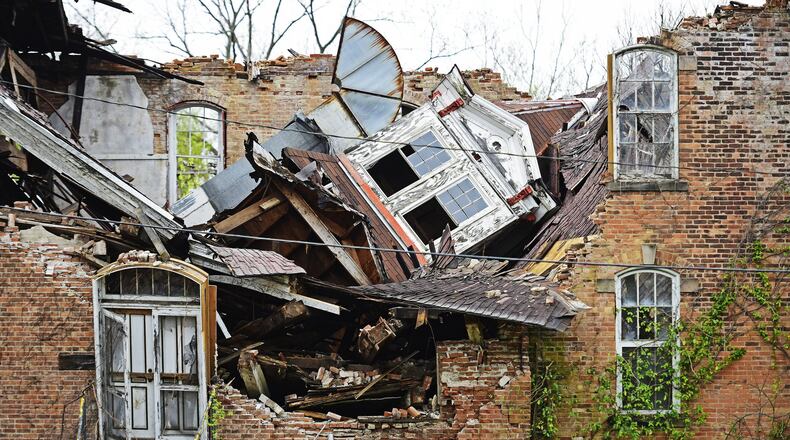In its residential program, the land bank uses state and federal funds and a one-percent share of Delinquent Tax Assessment Collections (DTAC).
Now, an organization called Thriving Communities wants land banks and legislators to support the budget amendment that would pay $75,000 up front for commercial and industrial demolition projects. The remainder of the cost would be a dollar-for-dollar match with local communities.
RELATED: Land bank getting results
The catch as far as Butler County officials are concerned is, if legislators approve the measure, the rules for the program are unknown. County Administrator Charlie Young said they cannot send an unqualified show of support.
“A letter of support for something means you support it. We’re being asked to support not only demolition but rehab, which is new,” he said to Executive Director Mike McNamara. “This (county) commission is very cognizant of what your words mean and imply as you craft whatever it is you are going to craft… Do you support rehab, do you support this or that, if you don’t, then your language should reflect that.”
Dan Acton, a board member who represents Commissioner Cindy Carpenter on the land bank board, said rehabbing private business property makes him “nervous.”
“I get nervous when we talk about government going in and actually doing rehabilitation of private industry…,” he said. “Very rarely have governmental programs been able to improve on what private industry has been able to do as far a rehabbing and nowhere near the cost of private industry.”
With $2.7 million it received in Moving Ohio Forward grants from the state, Butler County formed a land bank in 2012 to deal with blighted buildings. The cities of Hamilton and Middletown each gave $1.1 million to the land bank fund as well.
However, in 2014 Butler County’s application for additional state funds was denied because its land bank lacked steady income. At county Treasurer Nancy Nix’s request, the commissioners agreed to siphon one percent of DTAC to bolster the land bank and open up the blight-busting tool to other communities.
MORE: Land bank branching out
DTAC funds are late payment penalties on real estate taxes. Large counties generally take five percent of DTAC funds for their land banks, according to Nix. The one percent will garner about $114,300 this year.
Nix suggested the support letter have a “caveat” regarding county contributions.
“We could have a caveat in the letter that the funding level can’t be dependent on your level of DTAC funding,” she said.
The land bank board recently decided it would not ask the commissioners for a bigger slice of the delinquent tax pie. Kathy Dudley, an attorney on Hamilton’s staff who handles land bank business, said cities and townships would provide the dollar-for-dollar match, so DTAC funding levels shouldn’t be an issue.
MORE: Land bank won’t ask for more local taxes
McNamara said Hamilton, Middletown and Lemon Twp. — where a factory fell down last week — all said they could use the new cash, if it materializes.
Dudley said this new program would be important if the legislature approves the funding — $25 million for demolition and $25 million for rehabilitation of properties — and she said her city officials fully support it in principle and will approve matching money.
“There are places in our historic neighborhoods that have been abandoned, people have just walked away from them…,” Dudley said. “I think the commercial piece is something that’s been very much missing, and there are more commercial structures that are going to tax foreclosure because of the amount of money… We’re going to end up (demolishing) those, so any help would be beneficial.”
About the Author
